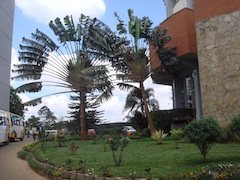| |
|
 |
Faith leaders in Kenya are trusted more than the Government
November 23, 2010:
 |
 |
 |
The All Africa Conference of Churches, Nairobi |
Kenyan farmers trust the Church more than the government. That is not the verdict of a church leader but of the Kenyan Agriculture Secretary himself, Dr Wilson Songa, speaking at the opening day of a conference on food in Nairobi yesterday.
The conference on food security and advocacy - a five-day gathering of faith groups and other organisations from Central and Southern Africa - was organised by the Ecumenical Advocacy Alliance and held at the All Africa Conference of Churches' conference centre in Nairobi, Kenya.
Dr Songa said: “Here in Kenya it is said that farmers trust most the Church, followed by the Ministry of Agriculture. Farmers take the Church very seriously – you are the most trusted.
"Let me sincerely appreciate the role of church-based organisations. You have worked to ensure food gets to the most needy, and continue to do so, and that cannot be taken for granted.”
ARC Faith in Food co-ordinator Susie Weldon told the conference faiths had a key role to play in restoring a balance in our relationship with the land and creation.
ARC's new Faith in Food initiative was about people of faith honouring their values in the food they eat, grow and buy, she said: "The vision is of faith communities creating a fairer, healthier and more sustainable food and farming system, and transforming the world through the food they eat – one meal at a time."
Africa's food challengeIn a packed day of presentations, the conference heard of the scale of the challenge facing Africa. The sub-Saharan population of 900 million is predicted to more than double to two billion people by 2050, yet rain fed agriculture which most of the continent relies upon, is expected to decline by 50% in that time.
Droughts and flooding caused by climate change is predicted to have a devastating effect on agricultural production in Africa - so much so that the Intergovernmental Panel on Climate Change believe yields could halve in just 10 years.
Delegates also heard about issues of economic injustice and lack of access to land, especially for women who make up the majority of small holder farmers.
Cheap imports of food were being dumped on African markets, putting local farmers out of business. And simply getting food to market could be difficult in a continent where lack of roads is a problem in rural areas.
Dr Songa said the right to food was now, for the first time, stipulated in Kenya’s new constitution: “It’s now the Government’s responsibility to make sure that everybody gets enough food.”
But just adopting the policy was not enough: “Implementing it is another challenge. We need good governance. Talking is useless without good governance.”
Faith influenceIn comments that highlighted both the opportunities for faith groups in influencing government, but also the potential pitfalls, Dr Songa said the Government wanted to engage much more closely with faith organisations to promote new agricultural methods to farmers.
“If we have technologies that we can get to the farmers, if we lose you then we will not be as effective as we should be,” he said.
“Farmers take the Church very seriously and it’s an area that we’ve not been using very well but we are so aggressive about getting these technologies out there that we will be getting hold of you. We need to engage much more seriously with you.”
For more information on ARC's Faith in Food initiative, click here. For the Ecumenical Advocacy Alliance's Food for Life programme, visit its website.
|
 |
 |
|
|
|
|
|
 |
November 5, 2010:
First Faith in Food workshop inspires and challenges
Could faith groups join together to create a trading network to source sustainably produced food? That was one of the ideas discussed at an inspiring and challenging Faith in Food workshop, organised by ARC and co-hosted in New York with the Jewish environmental group Hazon. |
 |
October 15, 2010:
Pope sends message for World Food Day
In a message to mark World Food Day tomorrow, the Pope has urged everyone to give priority to “one of the most urgent goals for the human family: freedom from hunger”. This year’s World Food Day has the theme: ‘United Against Hunger’. |
 |
December 3, 2010:
Nigerian religious leaders unite in London to address environmental crisis
Four senior Christian and Muslim leaders from Nigeria will come to the UK next week for a high profile meeting with senior British Bishops, other faith leaders and politicians to discuss the key faith role in the environment in Africa. |
 |
 |
|
|

